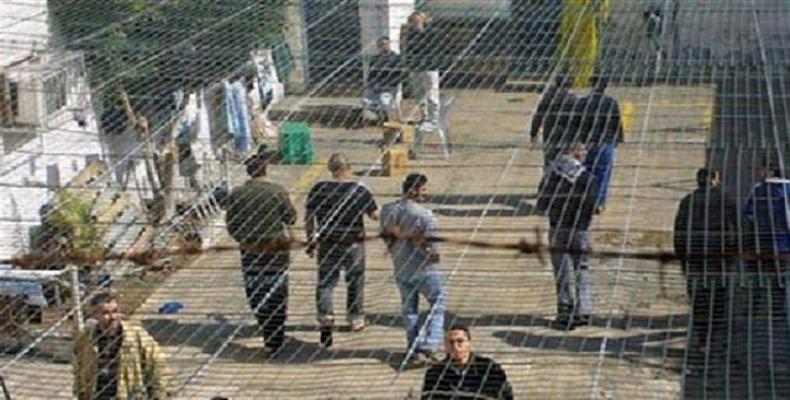Ramallah, May 17 (RHC)-- Seventy-six hunger-striking Palestinian inmates held in Israeli prisons have been hospitalized due to critical deterioration of their health conditions, as a mass hunger strike by Palestinian prisoners has entered its 31st day.
The Arabic-language al-Aqsa satellite television network announced the news, adding that the prisoners, who are all kept in Israel's Ofer prison, were taken to Hadrim field hospital for treatment and possible force-feeding.
Meanwhile, Imprisoned hunger strike leader, Marwan Barghouti, has said that he has decided to stop drinking water to express his profound protest at the conditions in Israeli prisons. According to a statement released by the Palestinian Committee of Prisoners’ Affairs on Tuesday, 57-year-old Barghouti, a former top leader of the Palestinian Fatah Movement, would escalate the protest action in response to Tel Aviv's persistent refusal to meet the hunger strikers' demands.
Barghouthi, the statement added, has said that the Israeli regime must agree to all of the demands made by hunger strikers under his leadership without bargaining or making compromises.
Since April 17th, some 1,800 Palestinian prisoners, from across the political spectrum, have joined the protest action, led by Barghouti, dubbed the Freedom and Dignity Strike. The strikers are demanding basic rights, such as an end to the policies of administrative detention, solitary confinement and deliberate medical negligence.
The Israeli regime has sentenced Barghouti, a highly popular figure among Palestinians, to serve five life terms in prison over his role in the Palestinian Intifada (Uprising). The Israel Prison Service (IPS) has placed him in solitary confinement since the initiation of the strike.
The IPS has continued to punish the hunger-striking detainees by placing them in solitary confinement and denying family and legal visits by their lawyers since the strike began on Palestinian Prisoners’ Day.
The Tuesday statement also quoted lawyer Khader Shqeirat, as saying that Barghouti’s decision to begin a dry hunger strike would be “a new turning point in the ongoing open-ended hunger strike.”
According to the statement, the Israeli regime is responsible for leaving the Palestinian inmates with no other choice but to go along a “tragic and disastrous road,” by adopting “a criminal stance regarding the just demands of prisoners.”
The committee also called on the UN Security Council and the General Assembly to hold an emergency meeting concerning the inmates' hunger strike in an attempt to compel Tel Aviv to respect the prisoners' rights enshrined under the international law. It further called on the world body to oblige the Israeli regime to put an end to its policy of inflicting a "slow death" on the Palestinian prisoners.
The Palestinian inmates regularly go on hunger strikes in protest against the administrative detention policy and their harsh prison conditions. Back in 2012, a similar hunger strike, involving some 2,000 Palestinian inmates, ended after an agreement was reached with Israeli authorities to terminate the policy of incarceration without trial or charge.
Some 6,500 Palestinians are currently being held in Israeli jails, 536 of them arbitrarily, according to figures provided by the Palestinian prisoners’ rights group, Addameer.
More than 70 Palestinian Hunger Strikers Hospitalized in Critical Condition


